中考专题复习实义动词
中考专题复习实义动词

morning). You must wait (for your turn). 不及物动词只能用于“主+谓”结构,但是可加任意
状语。 或者理解成:后面需要宾语时,必须加上相应的介
Could you ask him to call me, please? 请你让他给我打个电话,好吗? 1. My mother often asks me _D__early. A.get up B. got up C. getting up D. to get u 2.Yesterday afternoon Mrs Green told the boys _D____ football in the classroom. A. didn’t play B. to not play C. not play D. not to play
常见的及物动词
buy, catch, dress,find, found, forget, give, invent, like, make,marry, observe, offer, prevent, promise, raise, receive, regard, see, say, seat, supply, select, suppose, show, serve, take, tell....
3. —Do you want to eat something? —___D_, thanks. I am feeling sick now. I don’t feel like
_____. A. Yes; eating something B. No; to eat anything C. Yes; to eat anything D. No; eating anything
2025年外研版中考英语总复习专题一实义动词、系动词和助动词

2. Vacations are a chance to ____f_il_l____ your free time ____w_i_th____ meaningful activities.
命题点2 实义动词及短语词义辨析 一、猜测画线动词或短语在语境中的汉语意思(熟词生义) 1. Jimmy helps the old man every weekend, and his kindness
deeply touches his classmates. ____触__动____ 2. I thought he was kidding when he said he was going to leave
5. Allen is my best friend, and I have never questioned her honesty.怀__疑__;__质__疑__
一 二三
二、从方框中选择合适的单词或短语并用其适当形式填空 connect with, hide, cheer...up, offer, separate, take up, manage, expect, fill...with, turn out
school. __开__玩__笑____
一 二三
3. It’s time for me to leave home and I feel sad to part from my parents. _和__…__…__分__开_
4. As time went on, he grew more and more patient with his children. _逐__渐__变__得___
中考英语复习动词与动词短语知识讲解
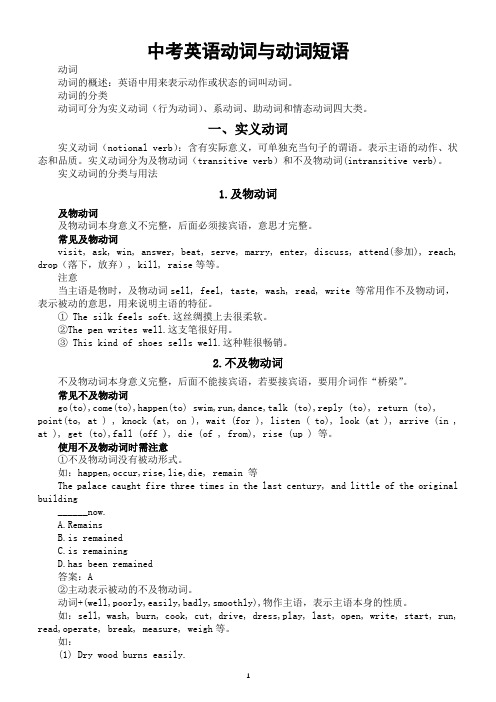
中考英语动词与动词短语动词动词的概述:英语中用来表示动作或状态的词叫动词。
动词的分类动词可分为实义动词(行为动词)、系动词、助动词和情态动词四大类。
一、实义动词实义动词(notional verb):含有实际意义,可单独充当句子的谓语。
表示主语的动作、状态和品质。
实义动词分为及物动词(transitive verb)和不及物动词(intransitive verb)。
实义动词的分类与用法1.及物动词及物动词及物动词本身意义不完整,后面必须接宾语,意思才完整。
常见及物动词visit, ask, win, answer, beat, serve, marry, enter, discuss, attend(参加), reach, drop(落下,放弃), kill, raise等等。
注意当主语是物时,及物动词sell, feel, taste, wash, read, write 等常用作不及物动词,表示被动的意思,用来说明主语的特征。
① The silk feels soft.这丝绸摸上去很柔软。
②The pen writes well.这支笔很好用。
③ This kind of shoes sells well.这种鞋很畅销。
2.不及物动词不及物动词本身意义完整,后面不能接宾语,若要接宾语,要用介词作“桥梁”。
常见不及物动词go(to),come(to),happen(to) swim,run,dance,talk (to),reply (to), return (to), point(to, at ) , knock (at, on ), wait (for ), listen ( to), look (at ), arrive (in , at ), get (to),fall (off ), die (of , from), rise (up ) 等。
使用不及物动词时需注意①不及物动词没有被动形式。
初中英语2025届中考动词考点分类讲解练习(实义动词+系动词+助动词+情态动词)
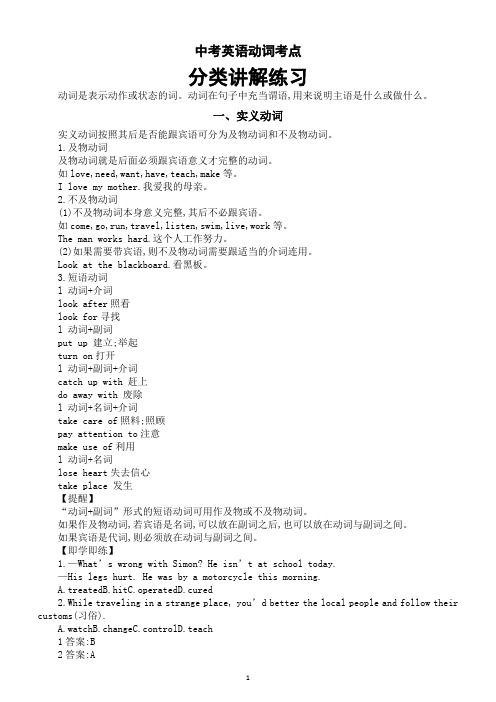
中考英语动词考点分类讲解练习动词是表示动作或状态的词。
动词在句子中充当谓语,用来说明主语是什么或做什么。
一、实义动词实义动词按照其后是否能跟宾语可分为及物动词和不及物动词。
1.及物动词及物动词就是后面必须跟宾语意义才完整的动词。
如love,need,want,have,teach,make等。
I love my mother.我爱我的母亲。
2.不及物动词(1)不及物动词本身意义完整,其后不必跟宾语。
如come,go,run,travel,listen,swim,live,work等。
The man works hard.这个人工作努力。
(2)如果需要带宾语,则不及物动词需要跟适当的介词连用。
Look at the blackboard.看黑板。
3.短语动词l 动词+介词look after照看look for寻找l 动词+副词put up 建立;举起turn on打开l 动词+副词+介词catch up with 赶上do away with 废除l 动词+名词+介词take care of照料;照顾pay attention to注意make use of利用l 动词+名词lose heart失去信心take place 发生【提醒】“动词+副词”形式的短语动词可用作及物或不及物动词。
如果作及物动词,若宾语是名词,可以放在副词之后,也可以放在动词与副词之间。
如果宾语是代词,则必须放在动词与副词之间。
【即学即练】1.—What’s wrong with Simon? He isn’t at school today.—His legs hurt. He was by a motorcycle this morning.A.treatedB.hitC.operatedD.cured2.While traveling in a strange place, you’d better the local people and follow their customs(习俗).A.watchB.changeC.controlD.teach1答案:B2答案:A二、系动词系动词不能单独作谓语,必须与表语一起构成谓语。
中考备考 动词和动词短语 专项讲解及中考练兵及答案
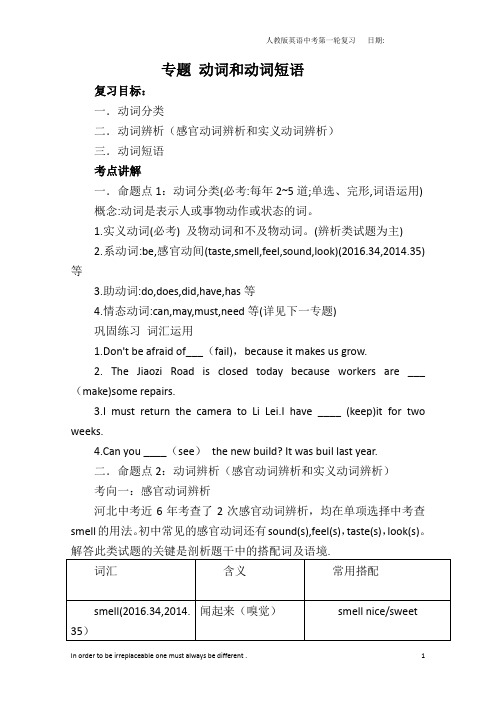
专题动词和动词短语复习目标:一.动词分类二.动词辨析(感官动词辨析和实义动词辨析)三.动词短语考点讲解一.命题点1:动词分类(必考:每年2~5道;单选、完形,词语运用) 概念:动词是表示人或事物动作或状态的词。
1.实义动词(必考) 及物动词和不及物动词。
(辨析类试题为主)2.系动词:be,感官动间(taste,smell,feel,sound,look)(2016.34,2014.35)等3.助动词:do,does,did,have,has等4.情态动词:can,may,must,need等(详见下一专题)巩固练习词汇运用1.Don't be afraid of___(fail),because it makes us grow.2. The Jiaozi Road is closed today because workers are ___(make)some repairs.3.I must return the camera to Li Lei.I have ____ (keep)it for two weeks.4.Can you ____(see)the new build? It was buil last year.二.命题点2:动词辨析(感官动词辨析和实义动词辨析)考向一:感官动词辨析河北中考近6年考查了2次感官动词辨析,均在单项选择中考查smell的用法。
初中常见的感官动词还有sound(s),feel(s),taste(s),look(s)。
解答此类试题的关键是剖析题干中的搭配词及语境.巩固练习单项选择1 .(2016 河北34 题)The air___fresh after the rain. And the sky is blue.A. feelsB. tastesC. smellsD. sounds2. (2014 河北35 题) Mom is making dinner. It___so nice!A. smellsB. tastesC. feelsD. sounds3. The cake ____delicious. I’d like to have another one.A. tastesB. looksC. soundsD. feels4.TFBOYS's songs ____sweet and many of us like lislening to them.A. soundB. feelC. tasteD. look5. This dress is made of silk.It ____comfortable.A. looksB. smellsC. feelsD. sounds考向二:实义动词辨析1.实义动词辨析(6年15考)解答实义动词词义辨析类试题时,首先要分析各个选项的词义,然后分析语境,找出关键词,或者根据前后文语境的逻辑关系来确定正确答案。
2024年中考英语三轮复习学案实义动词、助动词have考点总结

2024年中考英语三轮复习学案实义动词、助动词have考点总结H a v e的用法可以很简单,也可以很复杂。
当ha v e 作为实义动词时,它和其他任何动词一样需要一个助动词,例如 d o,来构成疑问句和否定句,此时通常不使用它的缩写形式。
→H a v e 具有“拥有”或“遭受”(痛苦、疾病等)的含义需要动词d o 来构成疑问句和否定句,其过去式是 h ad,此时它是一个静态动词,不能用在进行时中。
D o yo u h a v e t i m e?你有时间吗?I’v e h ad t hi s w a t ch s i n ce I w a s a c hi l d.我从小就有这块表。
I h a v e a t e r ri bl e h ea d a c h e.我头疼得厉害。
→H a v e t o 表示义务通常用来谈论他人的义务:规则、规定等。
在这种情况下,hav e也是一个静态动词。
W e h av e to w e a r a u ni f or m at s c ho ol.我们在学校必须穿制服。
R em e m b e r yo u h ave t o r et ur n t h e b ook be f o re n ex t m o nt h.记住你必须在下个月之前还书。
我们需要d o 或另一个助动词来构成疑问句和否定句。
Y o u w o n’t h a v e t o sh o w m e yo u r c r e de n t i al, i t wo n’t b en e c e s s a r y.你不必向我出示你的证件,也没有必要。
I d i d n’t h av e t o s ay a n yt h i n g,be c a use t h e y a l r e ad y k n ew.我什么也不用说,因为他们已经知道了。
H a v e t o的否定形式用于谈论非必要性(而不是禁止)。
中考复习九年级英语专题复习 题型七 动词(动词短语)
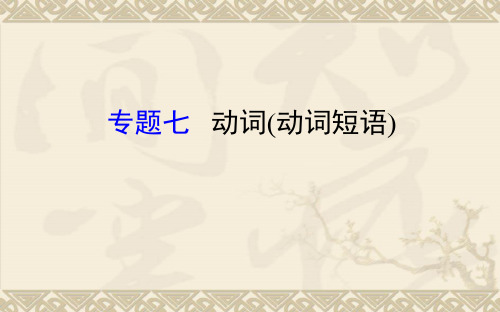
A. put on
B. put up
C. take off
【解析】选C。考查动词短语的辨析。句意: ——今天
太热了。——是的, 你为什么不(脱下)你的夹克? A的意
思为穿上, B的意思为张贴或举起, C的意思为起飞或脱
下。故选C。
③The firemen soon ________ the big fire.
对……感兴趣 做……迟到 与……不同 对……担心 被……覆盖 对……友好
6. 动词+名词 take aim瞄准 lose heart失去信心
take place发生 keep watch值班
【即学活用】
①The little boy ________ his seat to an old lady on the
come over to pass on to get on with
顺便来访 把……传递给…… 与……相处
4. 动词+名词+介词 take care of make sure of have a look at make friends with make fun of pay attention to make use of
以便于我们能避开交通堵塞。avoid避免; plan计划;
follow跟随。
⑧She said she returned the book to the library. I’m
sure she ________ .
A. takes B. did
C. was
【解析】选B。考查替代动词的用法。后半句句意: 我
确信她归还了, 动词did代替过去的动词returned, 故选
B。
eat up吃光
初中英语中考专题复习——动词语境辨析(实义动词+近义动词+感官动词)
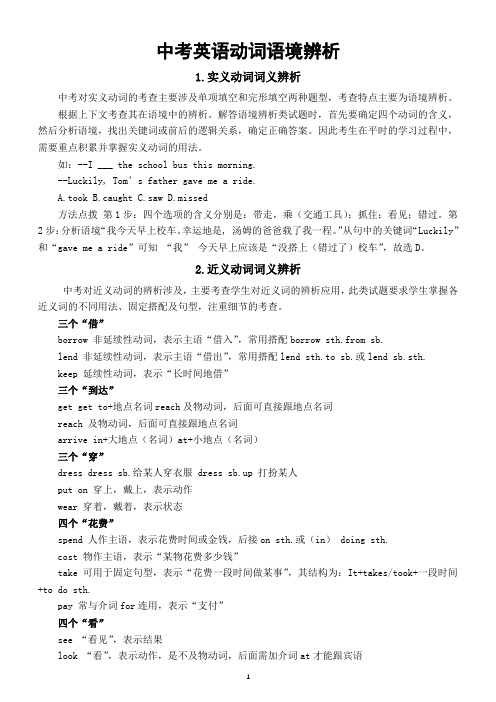
中考英语动词语境辨析1.实义动词词义辨析中考对实义动词的考查主要涉及单项填空和完形填空两种题型,考查特点主要为语境辨析。
根据上下文考查其在语境中的辨析。
解答语境辨析类试题时,首先要确定四个动词的含义,然后分析语境,找出关键词或前后的逻辑关系,确定正确答案。
因此考生在平时的学习过程中,需要重点积累并掌握实义动词的用法。
如:--I ___ the school bus this morning.--Luckily, Tom’s father gave me a ride.A.tookB.caughtC.sawD.missed方法点拨第1步:四个选项的含义分别是:带走,乘(交通工具);抓住;看见;错过。
第2步:分析语境“我今天早上校车。
幸运地是, 汤姆的爸爸载了我一程。
”从句中的关键词“Luckily”和“gave me a ride”可知“我”今天早上应该是“没搭上(错过了)校车”,故选D。
2.近义动词词义辨析中考对近义动词的辨析涉及,主要考查学生对近义词的辨析应用,此类试题要求学生掌握各近义词的不同用法、固定搭配及句型,注重细节的考查。
三个“借”borrow 非延续性动词,表示主语“借入”,常用搭配borrow sth.from sb.lend 非延续性动词,表示主语“借出”,常用搭配lend sth.to sb.或lend sb.sth.keep 延续性动词,表示“长时间地借”三个“到达”get get to+地点名词reach及物动词,后面可直接跟地点名词reach 及物动词,后面可直接跟地点名词arrive in+大地点(名词)at+小地点(名词)三个“穿”dress dress sb.给某人穿衣服 dress sb.up 打扮某人put on 穿上,戴上,表示动作wear 穿着,戴着,表示状态四个“花费”spend 人作主语,表示花费时间或金钱,后接on sth.或(in) doing sth.cost 物作主语,表示“某物花费多少钱”take 可用于固定句型,表示“花费一段时间做某事”,其结构为:It+takes/took+一段时间+to do sth.pay 常与介词for连用,表示“支付”四个“看”see “看见”,表示结果look “看”,表示动作,是不及物动词,后面需加介词at才能跟宾语watch “观看(比赛、电视等)”read “看(书、报等)”,表示阅读四个“说”speak 作及物动词时后接表示语言的名词,表示“说,讲述”say 常跟直接引语或间接引语,表示说的内容talk 是不及物动词,常跟介词to和with,意为“同……谈话”,也表示具有说话能力tell 意为“告诉”,与story连用,意为“讲故事”四个“拿”bring “带来,拿来”,表示拿到靠近说话人的地方take “拿去,带走”,表示拿到远离说话人的地方carry “扛,搬,用力移动”,没有方向fetch “去取,去拿”,表示往返拿东西四个“赢,输”lose 意为“输给”某人,固定搭配为lose to sb.fail 意为“失败”或“未做成某事”beat 意为“打败”,后接人或某支队伍win 意为“赢得,荣誉,地位,比赛等”四个“参加”join 一般指加入“党派”或“组织”并成为其中一员,如参军,入党,入团等join in 指参加竞赛、娱乐、游戏等活动take part in 指参加聚会或群众性活动attend 一般指出席会议、典礼、婚礼等四个“变化”turn 一般用于颜色的变化get 天变黑、变长或变短become 天气变暖或变冷等,表示渐变grow 形状变大或变小3.感官动词词义辨析sound 意为“听起来……”指听觉。
最新人教版中考英语词汇复习——专题一 动词 实义动词(第三组)

实义动词 (第三组)
44. __o_p__en___开;打开 45. __o_r_d_e_r__点菜;命令;订购 ★__o_r_d_e_r_s_b_._t_o__d_o_s_t_h_. _ 命令某人做某事 46. __o_w__n___拥有;有
返回目录
实义动词 (第三组)
返回目录
词汇训练
1. Though the player was very tired, he still __k_e_p_t__(keep) running towards the finishing line. 2. When I___k__n_e_w____(know) I won the first prize in the English competition, my heart was filled with joy. 3. Would you mind _l_en__d_in_g__(lend) me your English book? Mine is left at home. 4. Bob was so careless that he___l_o_s_t__(lose) his keys yesterday.
实义动词 (第三组)
返回目录
29. __m__a_r___做记号;打分;标记 30. __mk_a_r_r_y__结婚;嫁;娶 31. __m_a_t_c_h__相称;相配 n. 比赛;竞赛;将……配对 32. __m__e_a_n__意思是;打算;意欲;对某人重要(或有价值) ★__m__e_a_n_t_o_d__o_s_th__. _打算做某事 ★__m_e_a_n__d_o_i_n_g_s_t_h_. _意味着做某事 33. ___m_e_e_t__遇见;相逢 34. __m_e_n_t_io_n___提到;说到;写道(某人或某事)
实义动词知识点详解(初中英语专项复习)2

实义动词知识点详解(初中英语专项复习)实义动词是指具有完整意义的、可以单独作谓语的动词,主要表示主语的动作、状态和品质。
实义动词也可以与助动词结合表示更加复杂的动词意义,包括及物动词和不及物动词。
一、及物动词能跟宾语的动词称为及物动词。
英语中的动词大多数为及物动词,及物动词又可分为跟单宾语的及物动词、跟双宾语的及物动词和跟复合宾语的及物动词等。
1.跟单宾语的及物动词a c c e p t 接受a d mir e羡慕a d mi t 承认T h e y'v e d e c id e d to a c c e p t o u r o r ig in a l o f f e r.他们已决定接受我们最初的报价。
W e to o k ti me to s to p a n d a d mi r e th e v ie w.我们特意停下来欣赏风景。
N o n e o f th e s e p e o p le wi ll a d mi t r e s p o n s ib il it y f o r th e i r a c t io n s.这些人中没有人原意承认为他们的行为负有的责任。
2.跟双宾语的及物动词(动词+间接宾语+直接宾语o r动词+直接宾语+介词+间接宾语)①加介词tob r in g带来s h o w 给...看h a n d递t e ac h教H a n d me th a t b o o k,p l e a s e.(=H a n d th a t b o o k to me,p le a s e.)请把那本书递给我。
W il l yo u s h o w me yo u r tic k e t,p le a s e?(=W ill yo u s h o w yo u r tic k e t to me,p le a s e?)请把票给我看一下,好吗?②加介词f o rb u y 买ma k e制作c h o o s e选择c o o k做饭M y p a r e n ts b o u g h t me a n ic e b a c k p a c k.(=M y p a r e n t s b o u g h t a n i c eb ac k p a c k f o r m e.)我父母给我买了一个很好看的背包。
中考英语动词知识点讲解
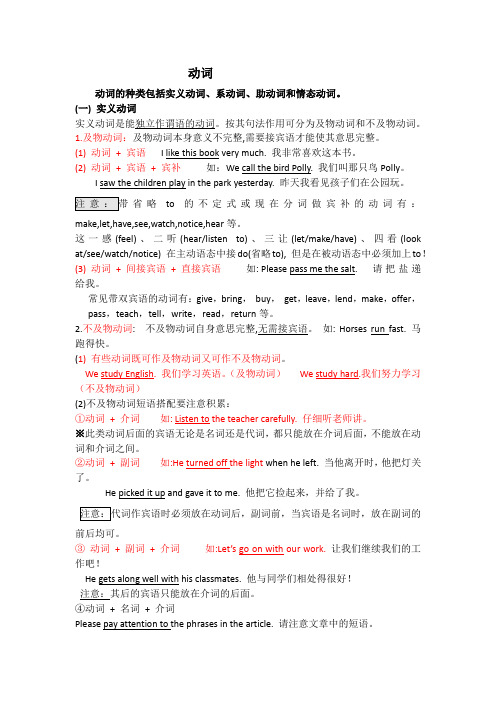
动词动词的种类包括实义动词、系动词、助动词和情态动词。
(一) 实义动词实义动词是能独立作谓语的动词。
按其句法作用可分为及物动词和不及物动词。
1.及物动词:及物动词本身意义不完整,需要接宾语才能使其意思完整。
(1) 动词+ 宾语I like this book very much. 我非常喜欢这本书。
(2) 动词+ 宾语+ 宾补如:We call the bird Polly. 我们叫那只鸟Polly。
I saw the children play in the park yesterday. 昨天我看见孩子们在公园玩。
省略to的不定式或现在分词做宾补的动词有:make,let,have,see,watch,notice,hear等。
这一感(feel)、二听(hear/listen to)、三让(let/make/have)、四看(look at/see/watch/notice) 在主动语态中接do(省略to), 但是在被动语态中必须加上to!(3) 动词+ 间接宾语+ 直接宾语如: Please pass me the salt.请把盐递给我。
常见带双宾语的动词有:give,bring,buy,get,leave,lend,make,offer,pass,teach,tell,write,read,return等。
2.不及物动词: 不及物动词自身意思完整,无需接宾语。
如: Horses run fast. 马跑得快。
(1) 有些动词既可作及物动词又可作不及物动词。
We study English. 我们学习英语。
(及物动词)We study hard.我们努力学习(不及物动词)(2)不及物动词短语搭配要注意积累:①动词+ 介词如: Listen to the teacher carefully. 仔细听老师讲。
※此类动词后面的宾语无论是名词还是代词,都只能放在介词后面,不能放在动词和介词之间。
实义动词知识点详解(初中英语专项复习)1

实义动词知识点详解(初中英语专项复习)一、实义动的分类实义动词是能独立作谓语的动词,又可称为行为动词,如work,study,run等。
按其句法作用分为及物动词和不及物动词;按其持续性分为延续性动词和短暂性动词。
1.及物动词及物动词本身意义不完整,后面要跟一个名词或代词等作宾语才能使其意思完整。
(1)动词十宾语。
Dick is watching TV.迪克正在看电视。
(2)动词十宾语十宾补。
We call her Linda.我们叫她琳达。
「注意]接省略to的不定式或现在分词作宾补的动词有:make,let,see,watch,have,hear,notice等(3)动词+间接宾语+直接宾语。
双宾语动词后面跟两个宾语,直接宾语为动词直接涉及的事物;间接宾语往往指涉及的人。
间接宾语有时可放到后面去,由介词to或for引导,变成介词短语。
My friend always gives me some old books.我的朋友经常给我一些旧书。
常见的带双宾语的动词有:带有方向性①能接以to引导的间接宾语的动词常见的有:bring,give,leave,lend,offer,pass,play,read,send,show,take,teach,tell,write等。
Could you lend your dictionary to me?请你把你的字典借我用下好吗?She passed the salt to him.她把盐递给了他。
②能接以for引导的间接宾语的动词常见的有:build,buy,cook,cut,fetch,find,get,keep,make,order,save,pick,play,sing,take,win,write等。
Mother cooks breakfast for us every day.母亲每天都为我们做早饭。
I'll fetch a chair for you.我去给你拿一把椅子。
中考英语专题复习之动词及动词短语
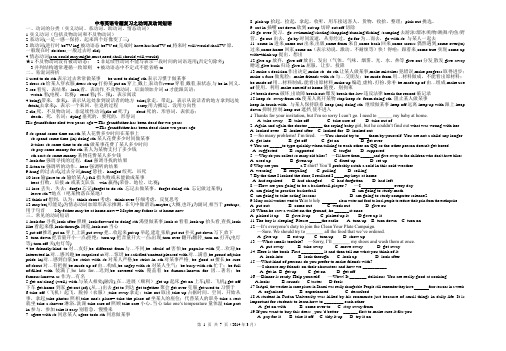
中考英语专题复习之动词及动词短语一、动词的分类(实义动词、系动词、助动词、情态动词)1.实义动词(包括及物动词和不及物动词)2.系动词(一是一感一保持,起来四个好像变了三)3.助动词(进行时be+V-ing,被动语态be+V-ed,完成时have/has/had+V-ed,将来时will/would/shall+V原,一般现在时do/does,一般过去时did)4.情态动词(can,could,may,might,must,need,shall,should,will,would)★1.不及物动词没有被动语态; 2.非延续性动词不能与表示一段时间的词语连用(否定句除外)3.并列结构通常遵循一致原则4.被动语态中不定式不能省略to二、易混词辨析ed to do sth表示过去常常做某事be used to doing sth表示习惯于做某事2.dress sb给某人穿衣服,dress sb up打扮某put on穿上,戴上,表动作;wear穿着,戴着,表状态,与be in同义。
3.see看见,表结果;look,看,表动作,不及物动词,后面须加介词at才能跟宾语;watch看(电视、比赛) read看(书、报),表示阅读4.bring(带来,拿来),表示从远处拿到说话者的地方take(拿走,带走),表示从说话者的地方拿到远处fetch(去拿来),表示一个来回、往返的过程carry,用力搬运,没用方向性5.die,死,不及物动词,非延续性动词(die of死于) dead死的,形容词,表状态;death,死,名词;dying垂死的,要死的,形容词His grandfather died two years ago.= His grandfather has been dead for wo years.= His grandfather has been dead since wo years ago.6.sb spend some time on sth某人花费多少时间在某事上sb spend some time (in) doing sth某人花费多少时间做某事it takes sb some time to do sth做某事花费了某人多少时间sb pay some money for sth某人为某物支付了多少钱sth cost sb some money某物花费某人多少钱7.look for强调寻找的过程,find强调寻找的结果8.listen to强调听的动作,hear强调听的结果9.hang的过去式(过去分词)hung悬挂,hanged绞死,吊死10.lose输(lose to sb输给某人) fail指失败或未能做成某事beat打败,后接sb或某支队伍win赢得(荣誉、地位、比赛)11.lose丢失,失去;forget忘记(forget to do sth 忘记去做某事,forget doing sth 忘记做过某事)leave sth +地点(吧某物落在某地)12.think of想到,认为;think about考虑;think over仔细考虑,反复思考13.may be(可能是)为情态动词加原形表示推测,在句中做谓语;maybe (大概,也许)为副词,相当于perhaps,用于句首My father may be at home now.= Maybe my father is at home now.三、常见的动词短语1.look for寻找,look after照顾, look forward to doing sth渴望做某事,look at看着,look up抬头看,查找,look like看起来像,look through浏览,look out当心2.put off推迟,put on穿上,上演,put away把…收起来,put up举起,建造,张贴,put out扑灭,put down写下,放下3. turn down把音量开小一点;拒绝;turn up把音量开大一点;出现,turn over翻开;翻转,,turn on 打开(电灯等) turn off 关(电灯等)4.be friendly/kind to对…友好,be different from与…不同,be afraid of害怕,be popular with受…欢迎,be interested in对…感兴趣,be surprised at对…惊讶,be satisfied/content/pleased with对…满意,be proud of(take pride in)对…感到自豪,be strict with sb对某人严格,be strict in sth 对某事严格, be good at擅长,be sure of/about对…有把握,be made up of由…构成,be angry with sb对某人生气;be busy with sth忙于;be full of/filled with装满了,be late for…迟到,be covered with覆盖着be famous/known for因…著名;be famous/known as作为…有名5.get on/along (well) with与某人相处(融洽),在…进展(顺利),get up起床,get on上车(船、飞机),get off 下车get home到家,get out (of) (从…)出去,get to到达get together聚会,get over克服,get used to习惯于6.take off(飞机)起飞,脱掉(衣服),take away拿走;take out取出,take up占据时间、空间,开始从事,拿起,take photos 照相,take one's place= take the place of 坐某人的座位;代替某人的职务 take a seat 就坐take a shower淋浴,洗澡take care of照顾 take care小心,当心take one’s temperature量体温 take part in参与,参加 take it easy别着急,慢慢来7. agree with sb同意某人agree todo sth同意做某事8. pick up拾起,捡起,拿起,收听,用车接送客人、货物,收拾、整理;pick out挑选。
实义动词讲解经典实用

5. –Oh, I’ve left my schoolbag in the
classroom.
--Don’t worry. I’ll ____ it for you.
A. bring
B. get
C. take
D. carry
实义动词讲解
Choose the best answer
6. –There’s too much sunshine.
强调状态。
实义动词讲解
词义辨析
5) __se_e______ “看见”,表结果; _l_o_o_k__(_a_t)_ “看”,表动作,不及物; _w__a_t_c_h___ “看(比赛,电视)” _r_e_a_d_____ “看(书、 Nhomakorabea)”,表阅读
实义动词讲解
词义辨析
6) _b_r_i_n_g_ “带来,拿来” ; _t_a_k_e__ “拿去,带走; _c_a_r_r_y_ “扛,搬” ,用力移动,无方向 _f_e_t_c_h_,_g_e_t_ “去取,去拿”,
3. Would you please _____ the TV? I can hardly hear the conversation between the two speakers.
A. turn on
B. turn up
C. turn off
D. turn down
实义动词讲解
Choose the best answer
4. –Nancy, don’t always ____ that old jacket. It looks terrible.
--But I think it’s cool, Mom.
A. wear
实义动词(单选题 15题 含解析)中考英语专题练习

实义动词(单选题 15题含解析)中考英语专题练习一、单选题(共15题)1.I am afraid we can not ____ to take a taxi. Let's go by underground instead.A. refuseB. affordC. forgetD. fall2. The Boeing 737 of Cuba airline crashed(坠毁)in Havana on May 18,2018, which ____ more than 100 deaths.A. causedB. influencedC. forced3. If a student is able to ____ somebody else what he's learnt to from textbooks,it shows he's understood it well.A. postB. lendC. teach4. -Jack usually ____ to help at the underground station on weekends.--Cool! Let's join him next Saturday.A. offersB. refusesC. forgets5. -I can't find my mobile phone.-Don't worry. Maybe you ____ it at home.A. forgotB. missedC. lostD. left6.—Can I _____________ Robinson Crusoe? Mrs. Zhao.—Sure,it's very interesting,but you can only ______________it for two weeks.A.borrow;lend B.lend;borrowC.borrow;keep D.lend;keep7. It is necessary for schools to _____ the need of all the students' development.A. cutB. hideC. refuseD. satisfy8. -we can't enter the room. I can't find my key.-Is it possible that you ____ it at home?A. leftB. fixedC. managedD. designed9. While travelling in a strange place,you'd better ____ the local people and follow their customs (习俗).A. watchB. changeC. controlD. teach10. -Jack hasn't taken his piano lessons for a long time.--He is considering ____ his piano course and spending more time on his study.A.to dropB.to throwC. droppingD. throwing11. -Dad,I'll be in the final singing competition tomorrow.-Be careful not to get a sore throat and ____ your voice.A. loseB. raiseC. dropD. break12. -Time will ___ whether I made the right choice or not.-I believe you can succeed.A. seeB. sayC. knowD.tell13. -What does the instruction say?-The colors in the dress will ____ if you use hot water.A. fallB. appearC. run14. -Why don't you choose the red tie?--For me,it doesn't ____ my shirt very well.A. fixB. acceptC. compareD. match15. Dreams are beautiful. However,to____ them needs lots of time and work.A. discoverB. findC. achieveD. stop【参考答案】一、单选题(共15题)1.B 解析:句意:我担心我们坐不起出租车,咱们改坐地铁吧。
初中英语2025届中考动词变化规则分类讲解(实义动词+系动词)
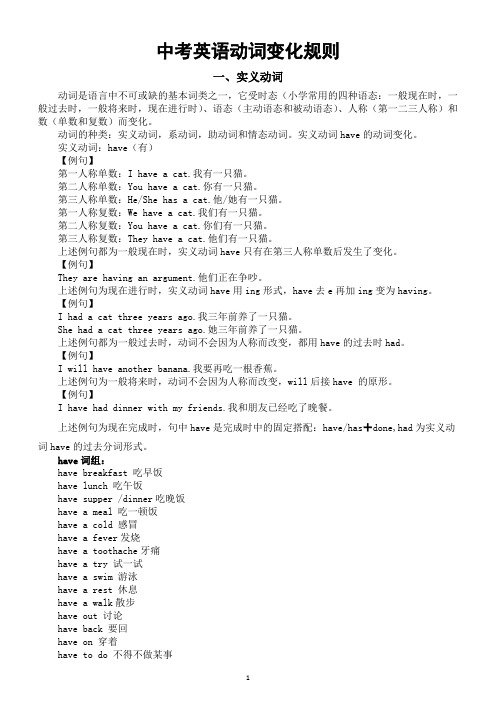
中考英语动词变化规则一、实义动词动词是语言中不可或缺的基本词类之一,它受时态(小学常用的四种语态:一般现在时,一般过去时,一般将来时,现在进行时)、语态(主动语态和被动语态)、人称(第一二三人称)和数(单数和复数)而变化。
动词的种类:实义动词,系动词,助动词和情态动词。
实义动词have的动词变化。
实义动词:have(有)【例句】第一人称单数:I have a cat.我有一只猫。
第二人称单数:You have a cat.你有一只猫。
第三人称单数:He/She has a cat.他/她有一只猫。
第一人称复数:We have a cat.我们有一只猫。
第二人称复数:You have a cat.你们有一只猫。
第三人称复数:They have a cat.他们有一只猫。
上述例句都为一般现在时,实义动词have只有在第三人称单数后发生了变化。
【例句】They are having an argument.他们正在争吵。
上述例句为现在进行时,实义动词have用ing形式,have去e再加ing变为having。
【例句】I had a cat three years ago.我三年前养了一只猫。
She had a cat three years ago.她三年前养了一只猫。
上述例句都为一般过去时,动词不会因为人称而改变,都用have的过去时had。
【例句】I will have another banana.我要再吃一根香蕉。
上述例句为一般将来时,动词不会因为人称而改变,will后接have 的原形。
【例句】I have had dinner with my friends.我和朋友已经吃了晚餐。
上述例句为现在完成时,句中have是完成时中的固定搭配:have/has➕done,had为实义动词have的过去分词形式。
have词组:have breakfast 吃早饭have lunch 吃午饭have supper /dinner吃晚饭have a meal 吃一顿饭have a cold 感冒have a fever发烧have a toothache牙痛have a try 试一试have a swim 游泳have a rest 休息have a walk散步have out 讨论have back 要回have on 穿着have to do 不得不做某事二、系动词动词是语言中不可或缺的基本词类之一,它受时态(小学常用的四种语态:一般现在时,一般过去时,一般将来时,现在进行时)、语态(主动语态和被动语态)、人称(第一二三人称)和数(单数和复数)而变化。
2024年中考英语复习实义动词的一般现在时
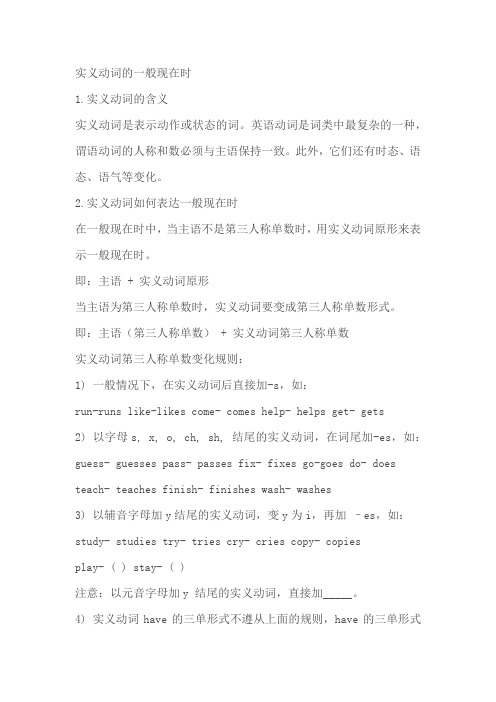
实义动词的一般现在时1.实义动词的含义实义动词是表示动作或状态的词。
英语动词是词类中最复杂的一种,谓语动词的人称和数必须与主语保持一致。
此外,它们还有时态、语态、语气等变化。
2.实义动词如何表达一般现在时在一般现在时中,当主语不是第三人称单数时,用实义动词原形来表示一般现在时。
即:主语 + 实义动词原形当主语为第三人称单数时,实义动词要变成第三人称单数形式。
即:主语(第三人称单数) + 实义动词第三人称单数实义动词第三人称单数变化规则:1) 一般情况下,在实义动词后直接加-s,如:run-runs like-likes come- comes help- helps get- gets2) 以字母s, x, o, ch, sh, 结尾的实义动词,在词尾加-es,如:guess- guesses pass- passes fix- fixes go-goes do- does teach- teaches finish- finishes wash- washes3) 以辅音字母加y结尾的实义动词,变y为i,再加–es,如:study- studies try- tries cry- cries copy- copiesplay- ( ) stay- ( )注意:以元音字母加y 结尾的实义动词,直接加_____。
4) 实义动词have的三单形式不遵从上面的规则,have的三单形式has。
3.实义动词构成的一般现在时意义和用法1) 表示经常的或习惯性的动作,与often, always, once a week, every day等表示频率的副词或时间状语连用。
如:I often go to school by bike.我经常骑自行车去上学。
David plays basketball after class every day.大卫每天放学后都去打篮球。
He often sleeps in English class.他经常在英语课上睡觉。
- 1、下载文档前请自行甄别文档内容的完整性,平台不提供额外的编辑、内容补充、找答案等附加服务。
- 2、"仅部分预览"的文档,不可在线预览部分如存在完整性等问题,可反馈申请退款(可完整预览的文档不适用该条件!)。
- 3、如文档侵犯您的权益,请联系客服反馈,我们会尽快为您处理(人工客服工作时间:9:00-18:30)。
A. not to eat B. to eat C. not eat D. eat
3.Tracy can’t play the match now. Please _A_____
instead.
A. have Lily do it B. have Lily to do it
C. make Lily to do it D. let Lily to do it 4.I hear someone ___B_ at the door. Please go and
These young trees will require/need looking after.
(5) 后面接双宾语的及物动词有:
动词tell (叫,让),ask (请求), want(希望), order(命令),get(使),wish(希望),warn(警告), teach(教),invite(邀请)等动词后常跟不定式作宾语 的补足语,构成tell/ask. sb. to do sth. “叫/请……某 人做某事”句型。
词,如to, of , at,on, for 等。
常见的不及物动词
agree, go, work, listen, look, come, die, belong, fall, exist, rise, arrive, sit, sail, hurry, fail, succeed....
兼作及物动词和不及物动词Байду номын сангаас
see who _____is.
A.knock; it
B. knocking; it
C. knocking; he D. knock; he
二、不及物动词:后面不能直接跟宾语
My watch stopped. It happened in June, 1932. She spoke at the meeting yesterday evening.
stop to do sth.停下来去做另一件事 stop doing sth.停止(正在)做某事 go on to do sth.接着做另一件事(已做完一件) go on doing sth.继续做(原来未做完的)某件事)
forget to do sth.忘记去做某事(还未做) forget doing sth.忘记做过某事(已经做) remember to do sth.记住去做某事(还未做) remember doing sth.记住曾做过某事
不
Does this cloth wash well.
同
1. Lily finished __B____ the book yesterday. A. read B. reading C. to read D. reads
2. —What are you busy __B____ these days? —Nothing much. A. do B. doing C. to do D. done
Could you ask him to call me, please? 请你让他给我打个电话,好吗? 1. My mother often asks me _D__early. A.get up B. got up C. getting up D. to get u 2.Yesterday afternoon Mrs Green told the boys _D____ football in the classroom. A. didn’t play B. to not play C. not play D. not to play
后面只能接动名词做宾语(v-ing)的动词
只能接动名词做宾语的动词: 避免错过少延期avoid, miss, put off 建议完成多练习suggest, finish, practice 喜欢想象经不住enjoy, imagine, can't help 承认否定与妒忌admit, deny, envy 逃避冒险莫原谅escape, risk, excuse, 忍受保持不介意stand, keep, mind
其他: try to do sth. 尽力做某事 try doing sth.试着做某事 mean to do sth. 打算做某事 mean doing sth.意味着某事
can’t help to do sth 不能帮忙做某事 can’t help doing 忍不住做某事
1. If you don’t feel well, you may just __B____ A. stopped reading B. stop reading C. stopped to read D. stop to read
1. Lily finished __B____ the book yesterday.
A. read B. reading C. to read D. reads 2. —What are you busy __B____ these days?
—Nothing much. A. do B. doing C. to do D. done 3. —Do you want to eat something? —_D___, thanks. I am feeling sick now. I don’t feel like ______.
+doing 表示习惯行为
I like swimming. 我喜欢游泳。 I like to go swimming. 我现在想去游泳。
后面既能接动名词,又可接动词不定式的动词有:
2. stop(停止),forget(忘记),remember(记得),try(试), go on(继续)等动词接不定式和-ing形式意义有区别。试 比较:
Shall I begin at once? She began working as a librarian after she left school.
When did they leave Beijing?
意
They left last week.
义
She’s studying medicine. She studies hard.
A. failed B. failing C. tried D. trying
后面既能接动名词,又可接动词不定式的动词有:
1.begin,start(开始),like, love,perfer(喜爱), hate(憎恨), continue(继续)可以接动词不定式或-ing形式作宾语。
+to do 表示具体的动作
后面只能接动词不定式(to do---) 作宾语的及物动词
1.常跟不定式作宾语的动词有: hope(希望), want(想、要),fail(失败),love(喜欢),pretend ( 假 装 ) , manage( 管 理 ) , agree ( 同 意 ) begin( 开 始 ) , need(需),learn(学会),agree(同意),decide, determine(决定), happen(发生)start(开始),refuse(拒绝)等。 I’m learning to skate on real ice. 我正在真正的冰上学滑冰。
3. —Do you want to eat something? —___D_, thanks. I am feeling sick now. I don’t feel like
_____. A. Yes; eating something B. No; to eat anything C. Yes; to eat anything D. No; eating anything
I used to live in the countryside. The foreigners arrived (at our school this
morning). You must wait (for your turn). 不及物动词只能用于“主+谓”结构,但是可加任意
状语。 或者理解成:后面需要宾语时,必须加上相应的介
(3) 后面接不带to的不定式 1.使役动词let(让),make(使),have(使)等; 跟不带to的不定式作宾语补足语 What makes you think I’m a farmer? 你凭什么说我是农民?
2. 感官动词see(看见),hear(听见),feel(感到), watch(观看),notice(注意到),look at(看),listen to(听)等跟不带to的不定式作宾语补足语
I live in Beijing with my mother.
It has a round face.
My watch stopped.
一、及物动词 (vt)
是指后面需要使用宾语使其意义完整的动词. 如:那条狗使这个孩子高兴起来.
That dog makes the boy happy.
On my birthday she gave me a mobile phone as a gift. They asked us to go fishing with them.
相
She’s typing a letter.
同
She’s typing.
Don’t move my things. The train is moving now.
She couldn’t stand the cold. Don’t stand in the rain.
意
义
Wash your hands before meals.
A woman saw it happen when she was walking past.
感官动词 (see)
+sb do doing sth
表示看见某人正在做某事 (动作正在发生) +sb doing sth 表示看见某人做了某事
